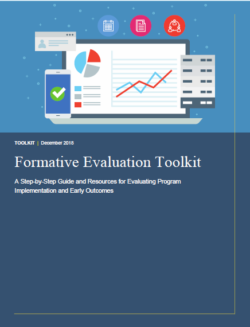Formative Evaluation Toolkit: A Step-by-Step Guide and Resources for Evaluating Program Implementation and Early Outcomes
Project: Technical Assistance on Evaluation for Discretionary Grant ProgramsFew evaluations of social programs have demonstrated positive results. Part of the problem may be that program teams and evaluators often conduct rigorous summative evaluations of programs that are not actually ready for that level of scrutiny.
 This toolkit introduces formative evaluation, a method for evaluating programs during early implementation to inform program improvement and assess readiness for rigorous summative evaluation. The toolkit is designed primarily for child welfare agencies and professionals to use in partnership with program evaluators, but others in human services may also find it useful. The content aligns with the experiences of state, local, and nonprofit child-serving organizations and evaluators funded through the Children’s Bureau discretionary grant program.
This toolkit introduces formative evaluation, a method for evaluating programs during early implementation to inform program improvement and assess readiness for rigorous summative evaluation. The toolkit is designed primarily for child welfare agencies and professionals to use in partnership with program evaluators, but others in human services may also find it useful. The content aligns with the experiences of state, local, and nonprofit child-serving organizations and evaluators funded through the Children’s Bureau discretionary grant program.
The toolkit guides users through the process of formative evaluation. It has three sections:
- Understanding Formative Evaluation provides an overview of formative evaluation, explains how it differs from summative evaluation, and describes the role of formative evaluation in the evidence-building process.
- Meeting Preconditions of Formative Evaluation poses questions and provides resources to help programs lay the groundwork for formative evaluation.
- Conducting Formative Evaluation outlines the steps to design and conduct formative evaluation and use the findings to improve programs and determine readiness for summative evaluation.
The toolkit includes—
- Examples based on a fictional agency, the Washington County Department of Human Services, at the end of each section
- Tools you can complete with your own program’s information using the Washington County examples as a guide
- Additional resources cited throughout the toolkit
- A glossary of key terms

